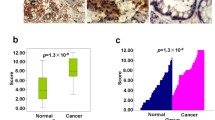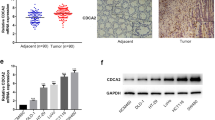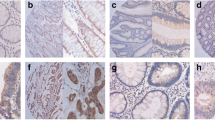Abstract
Mps1/TTK plays an important role in development of many tumors. The purpose of the present study was designed to investigate the role of TTK in colon cancer. We analyzed TTK and colon cancer in the GEO database, colon cancer tissues and normal tissues were collected to verify the results by immunohistochemistry. We detected the TTK expression in the colon cancer cell lines, and overexpressed or silenced TTK expression in colon cancer cell lines. GEO database showed that the expression of TTK was higher in the colon cancer tissues than normal tissues, higher level of TTK shows unfavourable prognosis in colon patients. Furthermore, high differentiation of colon shows the lower expression of TTK. The higher expression of TTK links with the high microsatellite status. However, the expression of TTK has no significant difference among the different stages of colon cancer patients, and has no significant relationship with recurrence or relapse. Here, we also report that the differential expression of TTK in colon cancer cells alters the intrinsic negative regulation of cell proliferation and differentiation, resulting in the difference of proliferation and differentiation capacity. TTK could activate the PKCα/ERK1/2 to influence the proliferation and inactivate the PI3K/AKT pathway to inhibition the expression of MUC2 and TFF3 that related to the differentiation of colon cells. In conclusions, TTK promote the colon cancer cell proliferation via activation of PKCα/ERK1/2 and inhibit the differentiation via inactivation of PI3K/Akt pathway. TTK inhibition may be the potential therapeutic pathway for the treatment of colon cancer.





Similar content being viewed by others
References
Torre LA, Bray F, Siegel RL, et al. Global cancer statistics, 2012. CA Cancer J Clin. 2015;65(2):87–108.
Chen W, Zheng R, Baade PD, et al. Cancer statistics in China, 2015. CA Cancer J Clin. 2016;66(2):115–32.
Matloff ET, Brierley KL, Chimera CM. A clinician’s guide to hereditary colon cancer. Cancer J. 2004;10(5):280–7.
Jemaà M, Galluzzi L, Kepp O, et al. Characterization of novel MPS1 inhibitors with preclinical anticancer activity. Cell Death Differ. 2013;20(11):1532–45.
Liu X, Winey M. The MPS1 family of protein kinases. Annu Rev Biochem. 2012;81:561–85.
Maia AR, de ManJ Boon U, et al. Inhibition of the spindle assembly checkpoint kinase TTK enhances the efficacy of docetaxel in a triple-negative breast cancer model. Ann Oncol. 2015;26(10):2180–92.
Gong W, Zhang GM, Liu Y, et al. IFN-gamma withdrawal after immunotherapy potentiates B16 melanoma invasion and metastasis by intensifying tumor integrin alphavbeta3 signaling. Int J Cancer. 2008;123(3):702–8.
Liu D, Li L, Zhang XX, Wan DY, Xi BX, Hu Z, et al. SIX1 promotes tumor lymphangiogenesis by coordinating TGFβ signals that increase expression of VEGF-C. Cancer Res. 2014;74:5597–607.
Weber TK, Steele G, Summerhayes IC. Differential pp60c-src activity in well and poorly differentiated human colon carcinomas and cell lines. J Clin Invest. 1992;90(3):815–21.
Zhou YH, Liao SJ, Li D, Luo J, Wei JJ, Yan B, et al. TLR4 ligand/H2O2 enhances TGF-β1 signaling to induce metastatic potential of non-invasive breast cancer cells by activating non-Smad pathways. PLoS ONE. 2013;8:e65906.
Wang Z, Liu JQ, Liu Z, et al. Tumor-derived IL-35 promotes tumor growth by enhancing myeloid cell accumulation and angiogenesis. J Immunol. 2013;190(5):2415–23.
Lv D, Jia F, Hou Y, et al. Histone acetyltransferase KAT6A upregulates PI3K/AKT signaling through TRIM24 binding. Cancer Res. 2017;77(22):6190–201.
Durual S, Blanchard C, Perrot V, et al. Expression of human TFF3 in relation to growth of HT-29 cell subpopulations: involvement of PI3-K but not STAT6. Differentiation. 2015;73(1):36–44.
Dominguez Brauer C, Thu KL, Mason JM, et al. Targeting mitosis in cancer: emerging strategies. Mol Cell. 2015;60(4):524–36.
Martinez R, Blasina A, Hallin JF, et al. Mitotic checkpoint kinase Mps1 has a role in normal physiology which impacts clinical utility. PLoS ONE. 2015;10(9):e0138616.
Mills GB, Schmandt R, McGill M, et al. Expression of TTK, a novel human protein kinase, is associated with cell proliferation. J Biol Chem. 1992;267(22):16000–6.
Iwakiri D, Podolsky DK. Keratinocyte growth factor promotes goblet cell differentiation through regulation of goblet cell silencer inhibitor. Gastroenterology. 2001;120(6):1372–80.
Housley RM, Morris CF, Boyle W, et al. Keratinocyte growth factor induces proliferation of hepatocytes and epithelial cells throughout the rat gastrointestinal tract. J Clin Invest. 1994;94(5):1764–77.
Taupin D, Podolsky DK. Mitogen-activated protein kinase activation regulates intestinal epithelial differentiation. Gastroenterology. 1999;116(5):1072–80.
Taupin D, Podolsky DK. Trefoil factors: initiators of mucosal healing. Nat Rev Mol Cell Biol. 2003;4(9):721–32.
Ji CD, Wang YX, Xiang DF, Bian XW, et al. Kir21 interaction with Stk38 promotes invasion and metastasis of human gastric cancer by enhancing MEKK2-MEK1/2-ERK1/2 signaling. Cancer Res. 2018;78(11):3041–53.
Little AS, Smith PD, Cook SJ, et al. Mechanisms of acquired resistance to ERK1/2 pathway inhibitors. Oncogene. 2013;32(10):1207–15.
Durual S, Blanchard C, Estienne M, et al. Expression of human TFF3 in relation to growth of HT-29 cell subpopulations: involvement of PI3-K but not STAT6. Differentiation. 2005;73(1):36–44.
Yu ZC, Huang YF, Shieh SY. Requirement for human Mps1/TTK in oxidative DNA damage repair and cell survival through MDM2 phosphorylation. Nucleic Acids Res. 2016;44(3):1133–50.
Wang X, Yu H, Xu L, et al. Dynamic autophosphorylation of mps1 kinase is required for faithful mitotic progression. PLoS ONE. 2014;9(9):e104723.
Jass JR. Classification of colorectal cancer based on correlation of clinical, morphological and molecular features. Histopathology. 2007;50(1):113–30.
Poynter JN, Siegmund KD, Weisenberger DJ, et al. Molecular characterization of MSI-H colorectal cancer by MLHI promoter methylation, immunohistochemistry, and mismatch repair germline mutation screening. Cancer Epidemiol Biomark Prev. 2008;17(11):3208–15.
Campbell PT, Jacobs ET, Ulrich CM, et al. Case-control study of overweight, obesity, and colorectal cancer risk, overall and by tumor microsatellite instability status. J Natl Cancer Inst. 2010;102(6):391–400.
Drucker A, Arnason T, Yan SR, et al. Ephrin B2 receptor and microsatellite status in lymph node-positive colon cancer survival. Transl Oncol. 2013;6(5):520–7.
Lan W, Cleveland DW, et al. A chemical tool box defines mitotic and interphase roles for Mps1 kinase. J Cell Biol. 2010;190(1):21–4.
Tannous BA, Kerami M, Van der Stoop PM, et al. Effects of the selective MPS1 inhibitor MPS1-IN-3 on glioblastoma sensitivity to antimitotic drugs. J Natl Cancer Inst. 2013;105(17):1322–31.
Slee RB, Grimes BR, Bansal R, et al. Selective inhibition of pancreatic ductal adenocarcinoma cell growth by the mitotic MPS1 kinase inhibitor NMS-P715. Mol Cancer Ther. 2014;13(2):307–15.
Colombo R, Caldarelli M, Mennecozzi M, et al. Targeting the mitotic checkpoint for cancer therapy with NMS-P715, an inhibitor of MPS1 kinase. Cancer Res. 2010;70(24):10255–64.
Maire V, Baldeyron C, Richardson M, et al. TTK/hMPS1 is an attractive therapeutic target for triple-negative breast cancer. PLoS ONE. 2013;8(5):e63712.
Miao R, Wu Y, Zhang H, et al. Utility of the dual-specificity protein kinase TTK as a therapeutic target for intrahepatic spread of liver cancer. Sci Rep. 2016;6:33121.
Kaistha BP, Honstein T, Müller V, et al. Key role of dual specificity kinase TTK in proliferation and survival of pancreatic cancer cells. Br J Cancer. 2014;111(9):1780–7.
Ocaña A, Pérez-Peña J, Alcaraz-Sanabria A, et al. In silico analyses identify gene-sets, associated with clinical outcome in ovarian cancer: role of mitotic kinases. Oncotarget. 2016;7(16):22865–72.
Hudler P, Britovsek NK, Grazio SF, et al. Association between polymorphisms in segregation genes BUB1B and TTK and gastric cancer risk. Radiol Oncol. 2016;50(3):297–307.
Gouyer V, Wiede A, Buisine MP, et al. Specific secretion of gel-forming mucins and TFF peptides in HT-29 cells of mucin-secreting phenotype. Biochim Biophys Acta. 2001;1539(1–2):71–84.
Podolsky DK, Lynch-Devaney K, Stow JL, et al. Identification of human intestinal trefoil factor Goblet cell-specific expression of a peptide targeted for apical secretion. J Biol Chem. 1993;268(16):6694–702.
Velcich A. Colorectal cancer in mice genetically deficient in the mucin Muc2. Science. 2002;295(5560):1726–9.
Wang Q, Wang X, Hernandez A, et al. Inhibition of the phosphatidylinositol 3-kinase pathway contributes to HT29 and Caco-2 intestinal cell differentiation. Gastroenterology. 2001;120(6):1381–92.
Acknowledgements
This work was supported by National Natural Science Foundation of China (Grant Nos. 81972739 and 81800149), and Natural Science Foundation of Jiangsu Province (Grant No. BK20170455). Hubei Provincial Natural Science Foundation of China (Grant No. 2018CFB173). Research Project of HuBei Provincial Department of Education (Grant No. Q20172802). Transforming Medical Research Innovative Talents Project (Grant No. YZHT201901).
Author information
Authors and Affiliations
Corresponding authors
Ethics declarations
Conflict of interest
All authors declare that they have no conflict of interest.
Additional information
Publisher's Note
Springer Nature remains neutral with regard to jurisdictional claims in published maps and institutional affiliations.
Electronic supplementary material
Below is the link to the electronic supplementary material.
Rights and permissions
About this article
Cite this article
Zhang, L., Jiang, B., Zhu, N. et al. Mitotic checkpoint kinase Mps1/TTK predicts prognosis of colon cancer patients and regulates tumor proliferation and differentiation via PKCα/ERK1/2 and PI3K/Akt pathway. Med Oncol 37, 5 (2020). https://doi.org/10.1007/s12032-019-1320-y
Received:
Accepted:
Published:
DOI: https://doi.org/10.1007/s12032-019-1320-y




